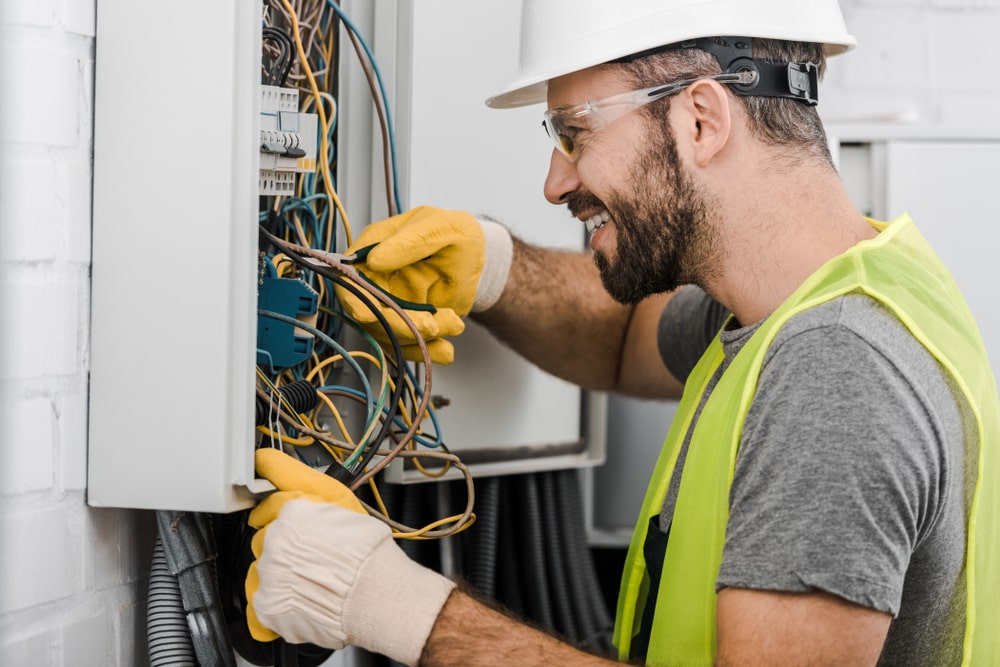Electrical breakers panel boxes provide the right amount of power to your home’s various rooms, and if they are outdated, you may need to replace them. Your home depends on these essential features to get electricity connected to the grid and to distribute it where needed. It is possible for homes to have serious electrical problems or even catch fire without them.
Although electrical panels are generally reliable and safe, they can start to show signs of wear and tear over time. In the event that strange smell or flickering lights have left you wondering whether you should upgrade your electrical panel, please review our list of warning signs to hire an electrician.
Electric panel upgrades are dangerous and should only be handled by a professional electrician. Let’s take a look at some warning signs that you might need to upgrade your electrical panel.
Electrical Panels: What Do They Do?
Consider your electrical panel as a warehouse for electricity. The warehouse sends out the correct amount of electricity when your kitchen or living room “orders” it.
There are times, however, when an order comes in for too much electricity. As a result, shipments are temporarily stopped at the warehouse.
This action protects your home from fire and other serious electrical hazards. As electricity demands increase, electrical panels can begin to struggle. It is common for a malfunctioning panel to emit warning signs. Here are some things to look out for.
Eight signs that it is time to upgrade your electrical panel:
It’s Original to Your Home.
There is a 25- to 40-year average life expectancy for electrical panels. Is yours within this age range?
If you do not notice any clear signs that your circuit breaker is having problems powering your home, it may be worth having a professional electrician check it out. An electrician can quickly determine if your home’s electrical system is damaged or worn out.
Breakers need to be flipped constantly.
Your electrical panel may trip when an area of your home draws too much power. If this happens, you must flip the affected breaker again to restore power.
This action does not automatically indicate a problem. However, if you find yourself constantly flipping breakers, it’s likely time to hire an electrician to inspect your breaker.
Breakers are not used in your panel.
The flipping of breakers can indicate that it’s time to upgrade your electrical panel. However, you may not even have breakers on yours. Homes built before 1960 had fuse panels that directed electricity.
Fuse panels are now fire hazards, and you should replace them with electrical panels. It’s time to upgrade if you have to change fuses rather than flip breaker switches.
There is rust or damage to your electrical panel.
If you spot water or rust on your electrical panel, call an electrician immediately. It’s a fire hazard to have rusted, broken, or corroded panels, so you need to repair or replace them.
There are not enough outlets.
To make up for the lack of electrical outlets throughout your house, do you often reach for a power strip? This is a sign that your electrical panel is not capable of coping with an increase in electricity.
In case your panel is able to accommodate additional circuits, an electrician can install additional outlets. If it cannot, a replacement electrical panel is your best option.
There is a burning smell.
You should always be concerned when you smell something burning in your home. Immediately take action if you suspect your electrical panel is emitting a smell. The failure of a circuit breaker can soon result in a serious fire in the house.
A burning plastic or wood smell is likely caused by the plastic jacket of an electrical wire melting. The problem may be in the walls of your home if you smell wood. An electrician may be able to fix the problem if the smell is subtle and disappears after a while. In case the smell is overwhelming and you’re worried that a fire has already started, evacuate your home and contact 911 immediately.
Electrical panel that is warm or hot.
Circuit breakers trip when they become overheated. Nevertheless, if your circuit breaker is warm or hot, this may indicate a severe malfunction. Get a qualified electrician out to inspect your panel right away.
When you plug things in, you see sparks.
Although you may occasionally see tiny sparks when plugging something into an outlet, you should pay attention to the size and frequency of the sparks. An outlet that sparks repeatedly or in large amounts is a clear indication that something is wrong with your wiring.
Whenever you see this warning sign, you should call an electrician to have it checked out. The cause might be a wiring or outlet issue.
Flickering or dimming lights when using an appliance.
When you start the dishwasher or microwave, do your overhead kitchen lights dim? In such a case, too much power is being drawn from a single circuit.
It may be possible to add extra circuits, but a complete replacement may be the best solution. It is best to get advice from a professional electrician about which route to take.
In the event that you notice any of the above signs, it may be time to upgrade your circuit panel. For expert assistance in making these crucial decisions, turn to the professionals at DFW Electrician & HVAC, who can guide you through the process with expertise and care.





